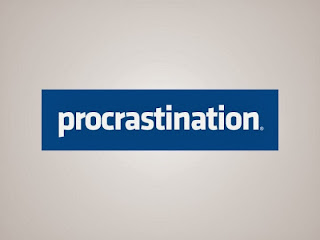Procrastination. It is a creative killer. We procrastinate writing, exercising, eating healthy. All sorts of things because at that moment in time, we don’t want to do the thing we think we should do and we have other things that we either want to do more. Or that are things we do instead of doing what we want to make ourselves do.
Example. I’ve done everything I can think of today to put off writing. I’ve:
- Done errands.
- Organized files.
- Worked on other projects.
- Surfed the Internet; and
- Done research.
All because I am procrastinating writing. In fact, to a degree even writing about the procrastination is part of putting off writing about the topic I have set myself to write on. Which is, or course, inspiration and creativity.
But since what’s really going on is procrastination why don’t we tactile that subject.
Now generally, I’m not a procrastinator. I do work best under deadlines. I like them. I find them motivating. But if I want to do something or am committed to it. I do it. Why then would I put off writing about something I love to talk about…
And I think what it comes down to is fear. I hear those thoughts in my head:
“Who do you think YOU are writing about inspiration?”
“What makes you an expert on creativity and inspiration?”
“Why would anyone be interested in what you have to say!”
And then I can argue with that voice in my head which is in it’s own way just another kind of procrastination.
We can distill it then.
FEAR = Procrastination.
Fear that keeps us from doing what we want to do, what we’ve decided to do, even sometimes what we enjoy. Fear of rejection, that our worse fears will be realized and we’re not as interesting or our ideas aren’t as valuable as we think they are. Either we’ll write something we don’t like or we’ll write something others think sucks or worse - both. It’s the “I’m not good enough syndrome”.
And once in the “not good enough” place, I’ll often look to those I admire to inspire me to new heights. So, I look to famous people. People who’s words have inspired millions. The classics. Did you know that all the classics are available online at http://www.online-literature.com.
Completely, for free. You can just read them. Like at a library. So I took a little time and read a bit, thinking I might be inspired. And yes, some very inspiring words. But they didn’t prompt me to DO anything.
In fact, the reading and looking for inspiration could be thought of as procrastination. And if what I want at the end of the day is to have been inspired to some creative action (i.e. writing, exercising, dancing, singing, doing my vision boards, decorating my living room - whatever), I need to not only be inspired but have the motivation to DO something.
Goal setting is a great way to get motivated and inspired.
To learn insider secrets and powerful goal setting strategies, visit SMART Goals to discover how to create a road map to achieve your goals for your personal development and self improvement.
I found myself remembering my father saying “Find direction in direction”.
I was very depressed one summer in the middle of college and I said to my dad
“Dad, I don’t know if I’m doing the right thing with my life. Maybe I shouldn’t go back to college, I feel like I should go sit under a tree and figure out what I’m doing before I continue on.”
And my Dad said “Would you enjoy sitting under a tree and thinking?”
“No, actually, I’d hate that. It’s just that in so many of the stories I read that’s what people do to FIND themselves. They go sit under a tree and meditate.”
“Well of course, you can do that. But I think people often find what actions they want to taking while they are moving instead of sitting still. At least then, you’ll be able to say to yourself ‘This thing I’m doing now, I don’t want to do this’. Or you may find things you really like and do more of them. Then at least you have something to compare. You can find direction in direction, while you’re going about your life.”
So, at the risk of sounding like a Nike ad, “Just do it”. Like I did today.
** Just write words on a page
** Start walking in some direction
** Introduce yourself to someone knew
** Take some action towards something you want
At least then you’ve started and you’ll be able to see if this something makes you feel good or feel bad. Then you can compare and evaluate along the way. Once I’m finished writing this blog, I can go back and read over it, edit it, roll it into a ball and start over. Either way this action leads to other actions. And, as I enjoy writing, I have to admit I feel better now that when I was talking to myself in my head about procrastination.
So, I wanted was going to write a blog about inspiration and creativity. And what I did instead was write a blog about the barrier to those - procrastination. In the process I got through my barrier and ended up feeling kinda creative. Go figure.














